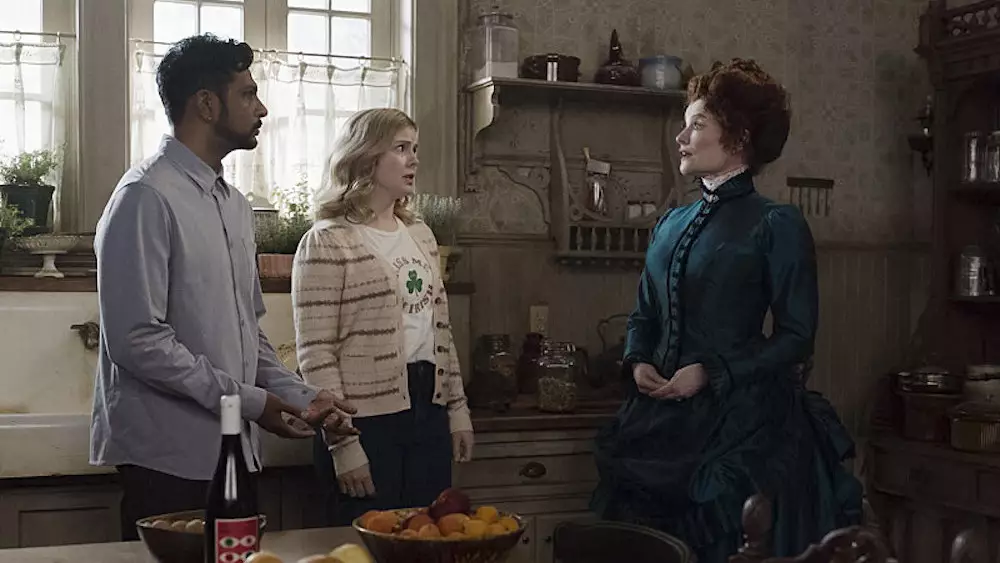In a captivating recent episode of CBS’s “Ghosts” titled “St. Hetty’s Day,” yet another layer of complexity is added to the character dynamics in Woodstone Mansion. This installment centers around Hetty, played expertly by Rebecca Wisocky, who discovers that her abilities are intimately tied to her Irish heritage. This revelation taps into deep themes around identity and recognition, reminding viewers of the intricate connections that exist between our pasts and our present selves.
Hetty’s newfound power allows her to manifest herself physically to the living once a year—specifically on St. Patrick’s Day. This premise invites not only a comedic exploration but a poignant examination of what it means to be seen and acknowledged. Wisocky beautifully encapsulates this struggle, noting that all the ghosts in the mansion share a common desire: the yearning for recognition after years of existing in a state of limbo.
The Struggles of Loneliness and Connection
What makes this episode particularly compelling is the spotlight it shines on Hetty’s emotional struggles, which often echo the broader human experience. In her mortal life, Hetty was neglected by her husband, leading to feelings of isolation that extend into her afterlife. The historical context of her character serves as a vehicle for addressing universal themes of loneliness, touched upon humorously but with truth. When Sunil, Jay’s cousin, arrives and can see her, it presents an exhilarating opportunity for Hetty to bridge the gulf of solitude she has faced.
This chance encounter not only internalizes the episode’s central theme but also illustrates the comedy of errors that arises when mismatched personalities try to connect. Wisocky expresses how Hetty’s interaction with Sunil allows her character to explore more childlike emotions, tapping into an innocence that is often overshadowed by her haughty exterior.
Power Dynamics Among Ghosts
While Hetty may revel in her day of visibility, it also significantly raises the stakes among her fellow spectral residents. The hierarchy of ghostly abilities becomes a playful yet meaningful thread throughout the series. In a world where Trevor can manipulate technology and Pete can roam freely outside the mansion, Hetty’s “power” might not rank as high as she would wish. This exploration of power—or the lack thereof—offers a clever commentary on societal status, privilege, and the longing for significance.
Wisocky’s playful admission, that Hetty’s gift might not elevate her standing among the ghosts, showcases the show’s trademark ability to explore character flaws while inserting humor. The comedic aspects are balanced with moments that reveal deeper truths, allowing audiences to both laugh and reflect. This balance is what makes “Ghosts” not just a comedy, but a rich tapestry of characters with relatable struggles.
Narrative Progression and Future Storylines
As the season unfolds, Wisocky hints at cliffhangers and unexpected plot twists that promise to keep audiences on the edge of their seats. The ongoing narrative surrounding Jay’s restaurant is rife with complications, especially with the introduction of quirky characters like a dinosaur-loving stripper. The chaotic energy introduced through such storylines serves as a crucial device for maintaining viewer engagement and demonstrates the show’s strong writing.
Moreover, the looming presence of Hetty’s “evil, dastardly husband” Elias suggests that the past is never truly buried in the world of “Ghosts.” It signifies that unresolved tensions will continue to shape their present, a dynamic that fuels both humor and drama in equal measure.
The Living History of Woodstone Mansion
Interestingly, Wisocky draws attention to how Woodstone Mansion functions almost as a character in its own right. The house is laden with stories and memories of those who have lived, loved, and lost within its walls. This perspective enriches every episode and encourages viewers to consider the history of locations we inhabit. It also enhances the ghostly narrative, where the past continually influences the present.
The richness of the show’s storytelling lies in its ability to blend humor with poignant reflections on life, death, and the human condition. With the series renewed for two additional seasons, there is ample opportunity for the nuances of these spectral lives to be further explored, inviting audiences to immerse themselves in the laughter and reflections that “Ghosts” so skillfully offers.

